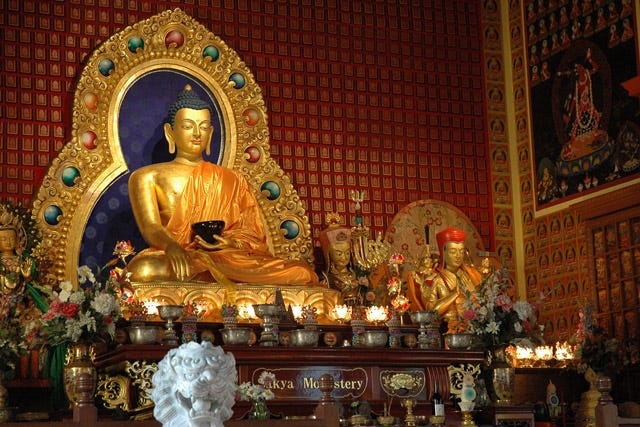Monks, Meditation, and Mysticism: A Primer on Buddhism for Orthodox Christians
No, it's not satanism and no they don't worship idols
Why am I writing this? A few reasons.
Having spent a decade as a practicing Buddhist I occasionally see some similarities in Orthodox Christianity and I think that the Buddhist Phronema and some practices may be helpful.
I have heard from Orthodox and other Christians a number of wildly inaccurate beliefs about Buddhism and a general fear of approaching or exploring any non-christian (particularly Eastern) beliefs or practices for fear of them being demonic, idolatrous, pagan, blasphemous, or sacrilegious. After 10 years as a practicing Buddhist, I don't believe this to be the case (although it could be if you allow it to.)
Personally, I think that many of these fears arise from a general xenophobia that seems to get triggered when confronted by anything we don't understand, is outside of our comfort zone, or seems foreign. When I look back on my life, I see similar freak-outs about Dungeons and Dragons and the satanic panic of the 1980s, apprehensions regarding Mormonism, Islam, etc. I understand where it's coming from; it's human nature (tribal boundaries, in-group, out-group, etc.) and I myself have many similar reservations about topics ranging from Islam to LGBTQ, etc.so I’m not saying that my sh*t don’t stink b/c it does. However, I try to reserve resistance to where I believe it is warranted - where I see a real threat or deep societal harm that will impact my family, particularly my children and future grandchildren.
The Buddha once said (and I'm probably misquoting), “All anger, hatred, ill will, and desire come from a lack of understanding." So, with that in mind, I will attempt to hit and connect the major philosophical points of Buddhism and try to point out orthodox Christian similarities, all in one article. This is a monumental task, and I'm 100% certain I will leave out important things and get things wrong due to oversimplification, my own limited understanding, or my faulty memory. So please have compassion on me. I will conclude with a quick look at Mindfulness meditation and a comparison to an Orthodox Christian practice called Nepsis b/c I see many parallels between the two. As a result of my attempt to cover a lot of ground, this article is long, and this may cause issues with publication via email. If so, at the end of your email should be a link to “View entire message” that may bring you directly to my Substack.
What the article is not intended to do is to convert anyone to Buddhism, lead anyone away from Christ, or promote Buddhist practice/beliefs over Christian practices/beliefs. This is not my intention at all. I left Buddhism for Orthodox Christianity for a reason.
What is Buddhism?
Buddhism is one of the major world religions, along with Christianity, Islam, Judaism, Sikhism, Taoism, Hinduism and others. And in this definition, the seeds of Western Christian angst reside. As a religion, Buddhism is often seen as a competition - something that makes many people uncomfortable - b/c anything that takes you away from God or Christ must be demonic, right? (in-group/out-group dynamics at play.)
However, Buddhism is not monolithic, and “orthodox" (Theravada) Buddhism is not necessarily a religion in the way that you might think, but there are forms that come close. People often think about Gods and divine/supernatural entities when they use the word religion. In Buddhism, no God or Gods are worshipped. It does not deny the existence of one (or many) Gods, nor does it embrace or worship any particular deity. Thus, it is technically neither theistic nor atheistic; this is why many say that Buddhism is a philosophy, and groups of “progressive” minded Westerners practice what is called Secular Buddhism. My particular Buddhist group referred to themselves as Humanistic Buddhists.1
It may be more helpful for us to think of Buddhism as a philosophy and an introspective practice than a traditional religion that worships specific Gods - and I think that's the best place to start.
Is Buddhism Atheistic?
The above might lead one to believe that Buddhists are Atheists, and that isn't true either. In fact, the Buddhist concept of Gods and Godhood differs from what you might expect in the West. Buddhists acknowledge that there are beings that are Gods, not just one but many, and that some of them may even promise to make you a God. However, these beings are attached to their own power, prestige, and glory. As a result, they can never achieve enlightenment, and thus, they should not be followed.




